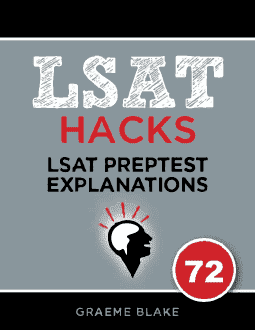QUESTION TEXT: Direct-mail advertising usually consists of advertisements…
QUESTION TYPE: Strengthen
CONCLUSION: It is wrong to say that direct mail advertising is bad for the environment.
REASONING: If people buy using direct mail, they don’t have to drive to the store.
ANALYSIS: I don’t get many direct mail ads. The last one I got was for a pen with my business name on it. They actually mailed me a sample pen.
Needless to say, I’ve never had a desire for a pen with “LSAT Hacks” on it. If someone gave me free LSAT Hacks pens, I believe I would get rid of them, unless they happened to be really nice pens.
So this direct mail ad was nothing but bad for the environment. It wasted paper. It wasted gas in the postal delivery system. And if I had responded to it, it would have been a waste of the pens I would otherwise never have bought.
We can strengthen the argument by saying direct mail ads are not like this. That instead, we only get direct mail ads for things we would otherwise drive to the store to buy. If you buy toilet paper from a direct mail ad rather than driving, then you probably are helping the environment, slightly.
___________
- This weakens the argument by showing that direct mail ads can lead to driving.
- CORRECT. This strengthens the argument. If you buy direct mail, you don’t have to drive. So if you were already going to buy the products you bought via direct mail, then it saved you a trip.
- Hard to say how this helps. Whether you buy from direct mail or a magazine, you’re not driving to the store. This answer should have compared direct mail to ads that require you to go to the store.
- This shows that direct mail advertisers aren’t idiots. They target their ads. But this doesn’t prove the ads reduce driving.
- This shows direct mail is growing. But that doesn’t help show that direct mail is reducing in-store purchases. Maybe direct mail just makes people buy more overall.


Thank you for your explanation, Graeme. I surely have a better understanding with this question now. But one thing that keeps bugging me is that even if people purchase products by phone or online, delivery men still have to end up adding pollutants to the air “by driving to whomever purchased the products.” So I keep thinking to myself that “wouldn’t that counteract what people did for environment by purchasing stuff without having to drive?”
Or, am I making false assumptions here?
Hi Amy,
Of course delivery drivers would still have to drive, but it’s extremely likely that the drive for the postman or delivery driver, who, in one trip brings many things to many people, is a more efficient use of gas than all of those people going to the stores the products came from.
The arguer might not even be right about direct mail not harming the environment, but that’s not important. We’re looking for a fact that strengthens the argument that is being made, and (B) does this well!
Wouldn’t B not necessarily strengthen the argument, because although direct mail may sell toilet paper, people can still buy it off the internet. They’re not forced to drive if they don’t get direct mail offers.
However, D alludes to the fact that direct mail saves paper and postal gas by only sending it to people where it’s relevant. It’s an alternate premise that necessarily supports the conclusion.
The stimulus says “products whose purchase would otherwise require the use of a car”. So your hypothetical scenario was already considered and dismissed.
What I’ve noticed in your four comments is that you read things out of context and imagine possibilities that contradict what’s written elsewhere. The LSAT requires careful considering of everything that’s written. Isolated bits can be misleading.
For D, you’re just making stuff up. You’ve described something that COULD be true. First, the mail order people could be wrong – who care what they *think*? We want to know if people are actually more likely to want those products on average. Second, D doesn’t tell us whether the sales made are new sales. If mail order causes people to buy things they wouldn’t buy otherwise, then it’s wasteful.